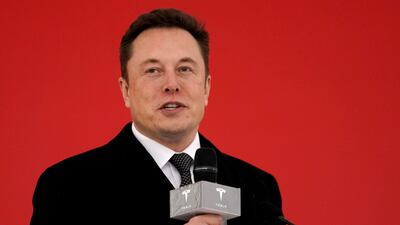Tesla’s female employees face “rampant sexual harassment", according to a lawsuit by a woman who works in the electric car maker’s factory in Fremont, California.
Jessica Barraza, 38, said in a complaint filed last week in state court in Oakland that she experienced “nightmarish” conditions as a night-shift worker at Tesla, with co-workers and supervisors making lewd comments and gestures to her and other women several times a week.
When she complained to supervisors and human resources, they failed to take action, Ms Barraza said.
She suffers from panic attacks as a result of three years of such behaviour and “is afraid to return to work knowing that her body could be violated at any time with no repercussions", the complaint reads.
Tesla did not immediately respond to a request for comment. Ms Barraza’s suit was reported earlier by The Washington Post.
Tesla is already facing a $137 million verdict handed down in October in favour of another worker, who said he experienced racism at the Fremont factory.
Owen Diaz, who is black, worked as an elevator operator at the Fremont warehouse and said that co-workers told him to "go back to Africa".
A juror in that case told Bloomberg News that the panel hoped to prod Tesla executives to “take the most basic preventative measures and precautions they neglected to take as a large corporation to protect any employee within their factory”.
Tesla is appealing against that award.
Tesla has been dogged by allegations of discrimination at its Fremont plant for years, but most employees are bound by arbitration agreements they must sign as a condition of employment, which keep most complaints confidential.
Arbitration is a long and expensive legal process that is generally cost-prohibitive for people and favours larger entities with deep pockets.
In 2020, 31 complaints were filed with California’s Department of Fair Employment and Housing alleging discrimination at Tesla on the basis of race, age, gender expression, disability and pregnancy, data from public records shows.
The state agency issued right-to-sue letters in most of the cases. A handful were closed with insufficient evidence.
Meanwhile, Tesla filed on Monday for approval of the first phase of its Giga Factory Texas with the state’s Department of Licensing and Regulation.
Mr Musk announced the company’s move from Palo Alto, California, to Texas after he became disgruntled with Governor Gavin Newsom’s stringent Covid-19 restrictions.
He called Mr Newsom’s mandates “fascist” and predicted that the pandemic would be over by April 2020.
The Texas factory will make Tesla’s Cybertruck and is near the liberal University of Texas.
Texas governor Greg Abbot said on CNBC’s Squawk on the Street, “… Elon had to get out of California because, in part, of the social policies in California and Elon consistently tells me that he likes the social policies in the state of Texas”.
Mr Musk replied on Twitter that he preferred to stay out of politics.
“In general, I believe government should rarely impose its will upon the people and, when doing so, should aspire to maximise their cumulative happiness. That said, I would prefer to stay out of politics.”
Agencies contributed to this report

